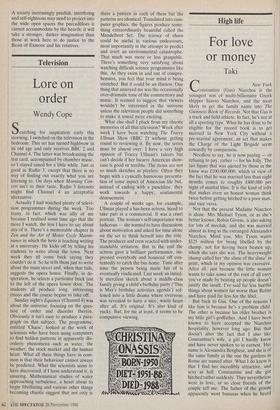Television
Lore on order
Wendy Cope
Searthing for inspiration early this morning, I switched on the television in the bedroom. This set has turned highbrow in its old age and only receives BBC 2 and Channel 4. The latter was broadcasting the test card, accompanied by chamber music, so I stayed tuned for a little while. Just as good as Radio 3, except that there is no way of finding out exactly what you are listening to. On days when Morning Con- cert isn't to their taste, Radio 3 listeners might find Channel 4 an acceptable alternative.
Actually I had watched plenty of televi- sion programmes during the week. Too many, in fact, which was silly of me because I realised some time ago that the more I watch, the less I have to say about any of it. There's a memorable chapter in Zen and the Art of Motor Cycle Mainte- nance in which the hero is teaching writing at a university. He kicks off by telling his students to write about the town. Next week they all come back saying they couldn't do it. So he tells them just to write about the main street and, when that fails, suggests the opera house. Finally, in de- speration, he selects a particular brick just to the left of the opera house door. The students all produce long, interesting essays and the course begins to take off.
Sunday night's Equinox (Channel 4) was about the universe, focusing on the ques- tion of order and disorder therein. Obviously it isn't easy to produce a para- graph on that subject. The programme, entitled 'Chaos', looked at the work of scientists who have been using computers to find hidden patterns in apparently dis- orderly phenomena such as water, the weather, the stock market and the human heart. What all these things have in com- mon is that their behaviour cannot always he predicted. What the scientists seem to have discovered, if I have understood it, is amazing. Mathematical studies of water approaching turbulence, a heart about to begin fibrillating and various other things becoming chaotic suggest that not only is
there a pattern in each of them but the patterns are identical. Translated into com- puter graphics, the figures produce some- thing extraordinarily beautiful called the Mandelbrot Set. The science of chaos could be useful in various endeavours, most importantly in the attempt to predict and avert an environmental catastrophe. That much was more or less graspable. There's something very satisfying about watching difficult science programmes like this. As they swim in and out of compre- hension, you feel that your mind is being stretched. But it could be an illusion. One thing that annoyed me was the occasionally over-dramatic tone of the commentary and music. It seemed to suggest that viewers wouldn't be interested in the universe unless the television people did something to make it sound more exciting.
What else shall I pluck from my chaotic memories of all that television? Week after week I have been watching The Tracey Ullman Show (BBC 2) without getting round to reviewing it. By now, the series must be almost over. I have a very high opinion of Tracey Ullman's talents but can't decide if her bizarre American show- case is good or terrible. The items are not so much sketches as playlets. Often they begin with a cynically humorous presenta- tion of some aspect of Amercian life but, instead of ending with a punchline, they work towards a happy, sentimental denouement.
A couple of weeks ago, for example, Ullman played a has-been actress, hired to take part in a commercial. It was a cruel portrait. The woman's self-importance was ludicrous — she wanted to have discussions about motivation and asked for time alone on the set to think herself into the role. The producer and crew reacted with under- standable irritation. But in the end the actress gave a brilliant performance, im- pressed everybody and bounced off con- tentedly to catch the bus home. Time after time the person being made fun of is eventually vindicated. Last week an initial- ly merciless sketch about a middle-class family giving a child's birthday party (`This is Max's birthday activities agenda') sof- tened into a little drama where everyone was revealed to have a nice, warm heart after all. It's original. It's also kind of yucky. But, for me at least, it seems to be compulsive viewing.










































































 Previous page
Previous page